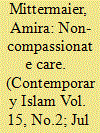| Srl | Item |
| 1 |
ID:
155716


|
|
|
|
|
| Summary/Abstract |
Anthropological interest in giving, including religious charity, has grown in recent years. However, studies of philanthropy have largely been confined to activities relating to human-to-human sociality. By contrast, this article explores conceptions of giving and acts of charity from the perspective of interactions between the living and the dead. Drawing on Buddhist traditions and popular rituals in contemporary Việt Nam, it takes an in-depth, ethnographic look at a series of ritual performances that seek to provide relief to ‘orphaned’ restless ghosts. Forms of religious charity constitute the unfortunate dead as the impoverished ‘other’ and strive to create a nexus of reciprocity that associates the living with the dead, and the human with the non-human. Further, the article argues that Vietnamese charitable acts for ghosts are not driven simply by an awareness of the needs and sufferings of others. Such concerns and sensibilities are undeniably instilled by moral and religious training in Buddhist disciplines. However, they are supplemented and reinforced by the menacing influence that the neglected dead are believed to be capable of exerting upon the living, in terms of the threat they pose, and the power they often exercise, putting one’s prospects for a prosperous future and general well-being in jeopardy.
|
|
|
|
|
|
|
|
|
|
|
|
|
|
|
|
| 2 |
ID:
179998


|
|
|
|
|
| Summary/Abstract |
Drawing on fieldwork at a large charity organization in Cairo, this article describes a bureaucratized Islamic ethics of care. Founded in 1975, the Mustafa Mahmoud Association today offers free and discounted medical services, funds micro-projects, and provides financial support to about 10,000 families each year. The bulk of that financial support comes from donors’ private donations in the form of obligatory and voluntary alms (zakāt and sadaqa). By taking a close look at three offices—the donation, intake, and disbursement office—I untangle the regime of care that shapes the daily transactions at this Islamic charity organization. In particular I highlight a significant gap between “caring for” and “caring about.” Donors view caring for those in need as a duty and frequently frame their donations in calculative terms, as a way of “trading with God.” Less central is a language of empathy or compassion. While this seemingly careless care-less? Careless means not careful, sloppy. form of caremight seem cold and heartless, I suggest that it offers a powerful alternative to the liberal illusion of “compassion.”
|
|
|
|
|
|
|
|
|
|
|
|
|
|
|
|